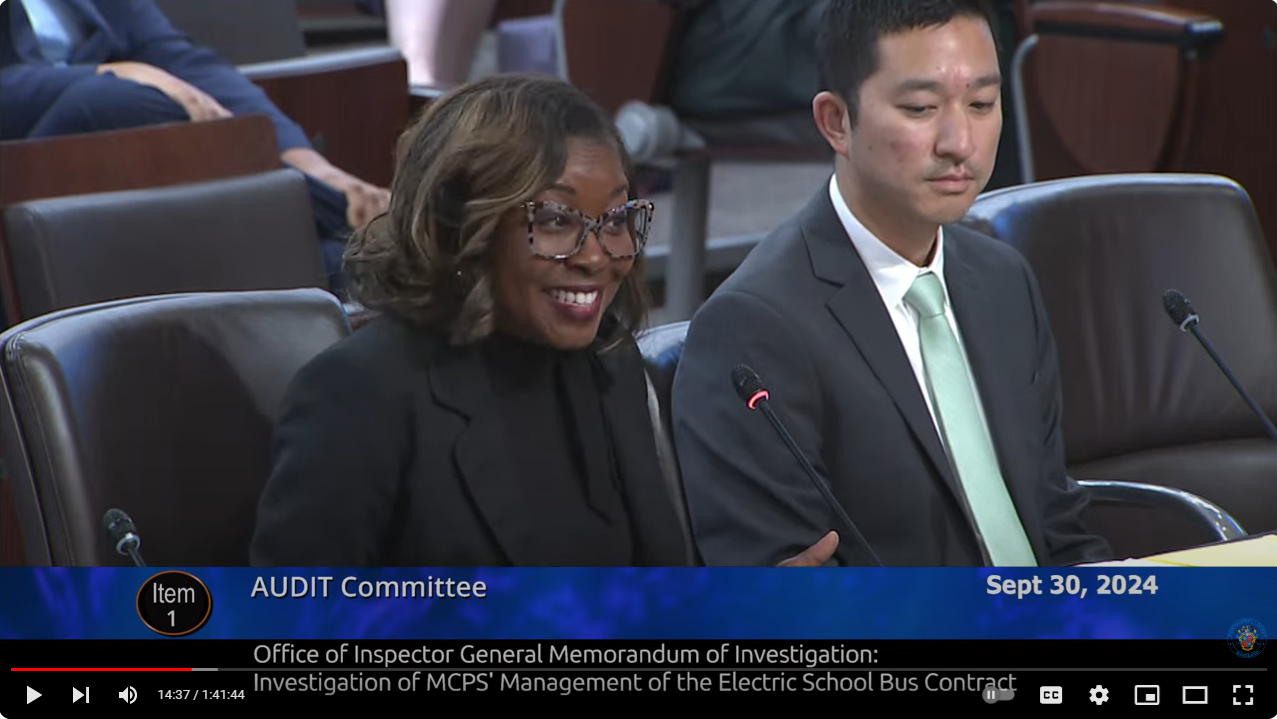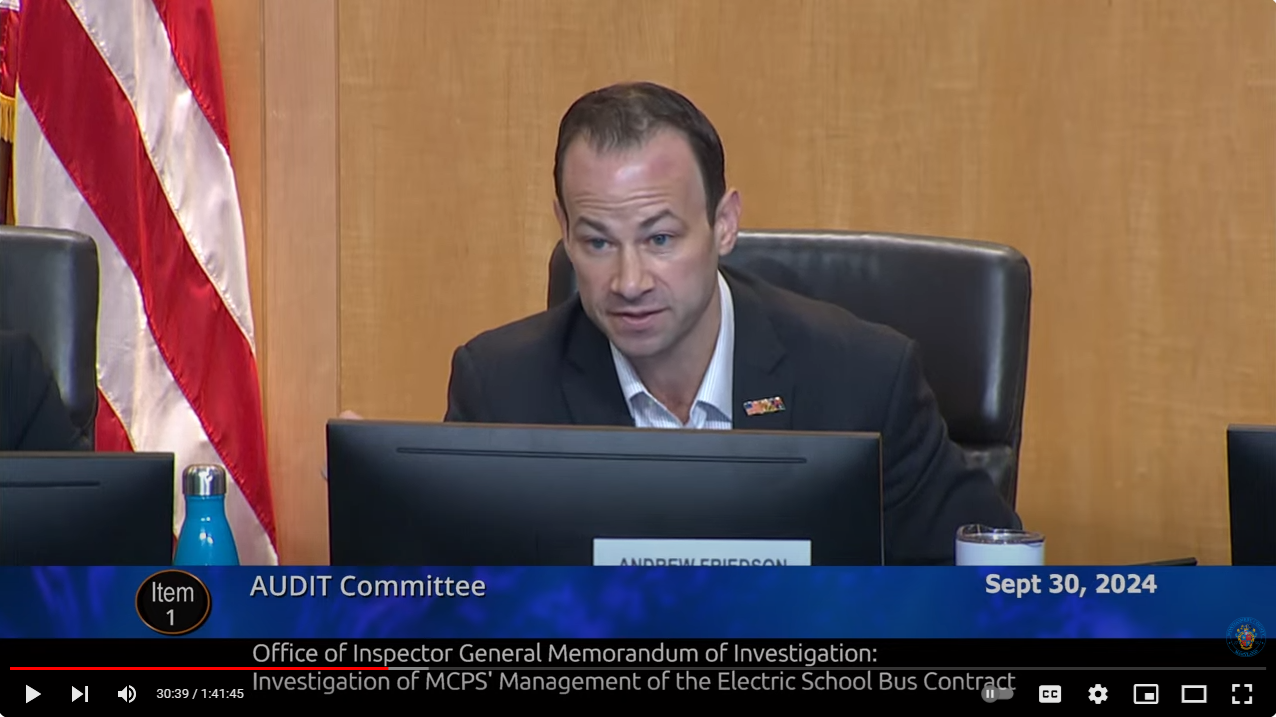By Adam Pagnucco.
Back in July, Montgomery County Inspector General (IG) Megan Davey Limarzi found “wasteful spending” in an MCPS electric bus contract and estimated that the contractor owed the school system “approximately $372,000 for failing to provide serviceable buses between FYs 2022 and 2024.” In a Monday meeting of the county council’s audit committee, MCPS admitted that the fees had mushroomed to $1.5 million. And that’s not all.
It’s conceivable that MCPS might not collect the money that it’s owed.
First, some background. In October 2022, then-Superintendent Monifa McKnight announced that MCPS would be procuring more than 300 electric buses in order to cut costs and greenhouse gas emissions. However, the contractor soon fell behind on bus deliveries and some of the buses were mechanically deficient, causing MCPS to fill in the gap with more diesel buses. The inspector general found that MCPS failed to hold the contractor accountable for its failures by triggering the performance fees owed in its contract. At the time, the inspector general estimated that the contractor owed MCPS $372,000 – a debt MCPS had not tried to collect.
On Monday, MCPS Chief of District Operations Dana Edwards told the council’s audit committee that the contractor actually owed $1.5 million in performance fees and MCPS had sent an invoice for that amount. Limarzi, the inspector general, was visibly astonished and said this was the first time she had heard this.

Dana Edwards, Chief of District Operations (left) and Michael Lewis, Acting Director, Department of Transportation.
Will MCPS collect the fees? Council Member Kate Stewart asked, “I don’t know if you’ll be able to answer this because you’re in negotiations now, with a new contract, but the IG’s report on page 4 did say that you’re looking at a new contract with terms that would eliminate the fee for, I believe, when the buses needed maintenance. Is that correct?”
Edwards replied, “So I would say we are in contract negotiations and I would prefer to preserve our terms, but I would like an opportunity once the contract is finalized, and I think that was our thought on being able to return and discuss it with the inspector general’s office, of what we have and what we’ve put in place.”
That’s when Council Member Andrew Friedson got involved. After a preliminary line of questioning on contract terms, Friedson zeroed in on fee collection. This was his exchange with Edwards.
*****

Council Member Andrew Friedson.
Friedson: When you say, as part of page 4 of the OIG report, “newly negotiated terms will likely eliminate the fee altogether in a future contract amendment,” meaning that this fee is essentially being used as a negotiating… as a part of the negotiation.
Edwards: The fee… our conversation, we’re currently in negotiations and I appreciate your conversation. I also am mindful of the negotiation space. And so we have invoiced the $1.5 million. It is our… we believe that the contractor will pay the $1.5 million. We have been in communication and we are in contract negotiations. There are several terms that we are looking at and several pieces that we are looking at as a part of how we move forward to best build out the support that we need as a school system to have the number of EV buses that we have, but also to be able to operate on a daily basis to get kids to and from their locations.
Friedson: There’s multiple ways to eliminate the fee. One would be for them to pay it. That seems to be the most obvious and easiest one to have happen and would be the most appropriate from my perspective given there are contractual obligations. We’re talking about public dollars here and a public school system. The other is for the school system to waive it in exchange for something else. And the third would be some combination of those two things. When it was noted here, “likely eliminate the fee altogether,” does that mean waiving it, does that mean having it be paid?”
Edwards: So at the time of the report, that was in July, I believe it is, it’s now October. Tomorrow is October, so time has elapsed since the report was written and we’ve been in steady negotiations from that time. So in terms of our interest around the terms, they may have shifted since the time of the report.
Friedson: I’m not sure I’m following that response, to be honest with you. I mean, I get that time has passed. So is there a change to that view that the newly negotiated terms based on the contract negotiations that are occurring now will eliminate the fee?
Edwards: We are discussing that within our contract negotiations. Back in July when the report was written, it said it would be likely. Since that time frame, we have engaged directly with our contractor. We have discussed several things. So our direction in terms of where we’re going… it may be a little bit different than what’s there and it may be the same. And I’m treading a little bit lightly just because I don’t want to weaken our negotiation standpoint as well as to be able to move along as judiciously as we can with the contract.
Friedson: OK, well I’m not going to push too hard. I understand where you’re coming from to a certain extent. I will say, the $1.5 million should be paid. It’s contractually obligated. And I don’t think, unless there is something of $1.5 million in value that the school system gets in exchange for not having the $1.5 million paid, dollar for dollar at least, there is no scenario under which I think that the vendor should be allowed not to pay fees that it has owed. These are public dollars, they are owed, that is true, full stop. And so I just want to be very clear about that. I understand you’re negotiating, but to me, this aspect of it isn’t much of a negotiation. The money is owed, period. And so I just think that needs to be made very clear to the vendor, yes a mistake was made, but the mistake doesn’t change the obligation under the contract. And if the mistake doesn’t change the obligation under the contract, the responsibility to pay it is on the vendor. This is not a shared responsibility. This is a responsibility where a vendor was engaged. They signed the contract. Once they signed the contract and agreed to do the deal, they have to pay the costs of doing that deal. Period. And they haven’t done that. They failed to live up to their obligations and there’s a cost to that. And they need to deliver. Period. And I think that just needs to be made very clear.
*****
Edwards could have said, “They will pay or we will terminate them.” She did not. Here’s why the fee matters, folks: if MCPS gives it up in negotiations on a new contract, it will have no option to punish bad performance short of termination. And that assumes MCPS will not give up that right too.
Later in the meeting, Council Member Sidney Katz asked how many vendors provide electric buses. Michael Lewis, MCPS’s acting director of transportation, replied that there are at least three large manufacturers of electric school buses. Katz then had the following exchange with Lewis.
*****
Katz: Is it possible you could be negotiating with more than one vendor to figure out who’s coming in with the best deal?
Lewis: Well, that would be a wonderful spot for us to be in. Currently, because we have so many of the electric buses and currently, still the largest in the United States, the infrastructure is built with our current vendor. And so that somewhat limits us in our ability on the small footprints that we have in all five of our transportation depots to expand that any more.
Katz: I guess that becomes a concern for negotiations though. I mean, if you know I’m the only deal in town, why am I dealing? So I believe you should look at, consider saying, you know what, Mr. Vendor, we love you dearly but we’re going to see if we can love somebody else as well. I think that would be a very wise thing to do.
*****
Combine Edwards’s dancing around on the fees with this revelation of MCPS’s lack of negotiating leverage and you can tell what is likely to occur here.
Two things must happen now.
First, Superintendent Thomas Taylor should pause this contract renegotiation. According to the inspector general’s report, this contract is valued at more than $160 million. That should make it one of the largest in all of MCPS. The contractor has a demonstrated record of failure which once caused MCPS to procure 90 diesel buses instead. A new contract without penalties for poor performance could be financially catastrophic for MCPS – and taxpayers. It’s worth hearing what can be offered by other vendors. Also, so long as the current contract language remains in place, MCPS preserves its ability to collect any further fees that could be owed in addition to the outstanding $1.5 million.
Second, while scrutiny from the county council is welcome and appropriate, the council has no authority over MCPS personnel or contracts. That authority is held by the school board, and it’s time for the board to exercise it. The board should hold its own public discussion of this issue, and if a new contract is presented that opens the possibility of further failures, the board should vote it down.
Otherwise, there will be more inspector general reports, more council audit committee meetings and more millions of tax dollars shoveled out the door as MCPS seeks inevitable budget increases.
